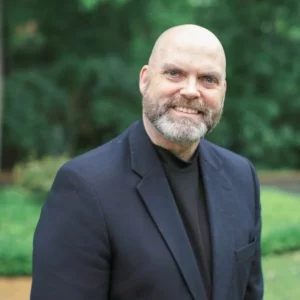I’ve been the pastor of Mosaic Church for more than nineteen years, so my relationship with many in our community is deep. We are a small but healthy church, with a core (but certainly not a majority) of people who care about the direction of the UMC. Most of our folks just care about the Kingdom of God. Nonetheless we’ve been talking about what’s coming (and what is now here) for quite a while. After the 2016 General Conference, we began holding listening sessions to help folks make sense of what was happening. In those conversations, we affirmed that we are a diverse group, as most any American congregation would be. We had solid, honest discussions together and many deep one-on-one conversations over coffee.
All this is to say that long before this current level of division in the UMC, those in our congregation who were interested or invested in the discussion had their chance to work out their own thoughts and our mutual relationships. I’ve been so gratified by our ability to work through differences with kindness and respect.
Placing my own theological leanings within the framework of a “centered-set model” seems to have helped us. Centered-set thinking allows us all to understand how we fit together. As the appointed spiritual leader of our congregation, I teach an orthodox Wesleyan theology, understanding that others are on a journey, too, that may or may not put us in complete agreement. We all understand, however, that there is a set of beliefs at our center on which we can agree and from which we can work. Even among newcomers, centered-set thinking has offered a comfort level for stepping into our community. Guests are welcomed as they are and where they are and don’t have to have it all figured out for us to love and respect one another. As they grow into our community, they are encouraged to voice questions and differences, understanding that in a centered-set world, the core holds and isn’t shaken or modified by public opinion. We’ve found this way of operating in community to be healthy and freeing.
As a church, we care deeply about the Body of Christ. As United Methodists waiting for disaffiliation to kick in, we have long since grieved our losses and no longer allow this crisis to define or control us. Not by a long shot. In fact, Mosaic has experienced some of its richest and most meaningful times of worship and growth in recent months. Most of that growth is due to on-going vital ministries that invite new believers, non-believers and frustrated wanderers into a conversation about what they believe about the world and God.
These days, my prayers for our tribe are focused on theological revival. I believe the coming revival will be theological. In fact, it may already be here. What’s happening at Asbury University, Asbury Seminary and now Lee University is so hopeful. These institutions are built on a foundation of holiness. Wilmore, Kentucky, where Asbury is located, is the birthplace of the holiness movement. That movement was (and is) defined by its commitment to entire sanctification and freedom from sin. No wonder God keeps going back there to tap into that deep spiritual well. This is where holiness got its day, and this is where we in the Arminian stream of orthodoxy were reminded that what we believe matters. It mattered then, and it matters now.
Not-so side question: Can you articulate the core of your personal theology? Can you defend it biblically? Do you know why you believe what you believe?
Spiritual awakening will happen as folks get serious about understanding what they believe and what makes us Methodist. Kevin Watson (who I quote regularly on this point) tells us that if Methodists lose the doctrine of entire sanctification, we take up a useless place in the Body of Christ. That’s a sobering thought. Which is to say that Methodism is not defined primarily by institutional unity but by a Spirit-level commitment to holiness. It is also not our affinity for each other that binds us, though that is certainly a gift. It is not our commitment to an institution, though I owe a great deal to the UMC for helping me live out my call. It is not even our commitment to serving folks, though the UMC has a marvelous missional arm that serves globally among poor and marginalized people.
What makes us Methodist is what we believe about the nature and role of Jesus Christ, the authority of scripture, our understanding of God’s grace, and particularly the role of sanctification in the life of a believer. We long to be saved to the uttermost — as in, the uttermost end of me and the uttermost end of the world. This is what connects and distinguishes us. It is our theological core. And when that core disintegrates, then isn’t it okay to acknowledge the end of one chapter so we can open a new one? The answer ought to be yes. Yes. Surely we can bless and send each other without biting and devouring each other.
While I don’t believe progressive and orthodox United Methodists can remain in the same tribe due the wide theological gap between us (nor should we; it holds no integrity), I am praying with many others that our separation can look more like multiplication than division and that we can honor one another in the process. I am praying that our separation provides a witness that our staying together can’t. I’m praying that we can be gracious toward one another, finding ways to bless and send one another as each annual conference works through the process of separation. Rather than ripping a page from a book, perhaps we can find a gentler way to turn the page on a new chapter.
In short, I pray that we will be kind. I pray that we will care for souls as we find ways to give space to incompatible theologies. I pray that we will not crush bruised reeds (and by this time most all of us are bruised). Please pray that prayer with me. In fact, I urge you to join me in fasting and praying for season of grace (click here to sign up), when we can set each other free to begin healing, and so we can explore what this next chapter might offer. Let’s fast and pray for a breakthrough … for release, for freedom, for healing, for understanding, for respect.
I certainly hope this season can birth something new (and soon) that allows us all to move on in ministry with integrity, no longer in contention with one another but loving deeply, from the heart. Wouldn’t it be something if this separation/ multiplication actually exposes the Kingdom of Heaven in the process of its birthing? Wouldn’t it be something if we even saw the glory of God?
Wouldn’t that be just like our Redeemer? Beauty from ashes, the oil of gladness poured over our mourning, the spirit of praise instead of a spirit of despair.








